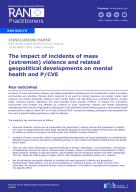Details
- Publication date
- 10 June 2024
- Author
- Directorate-General for Migration and Home Affairs
- Country
- Portugal
- RAN Publications Topic
- Mental health issues
Description
Incidents of mass (extremist) violence and related geopolitical developments can significantly impact individuals, communities and societies, through direct exposure to an event or indirect exposure via (social) media. Such exposure can impact individuals, leading to poor mental health and well-being (e.g. emotional distress, anxiety, anger, vicarious trauma, depression and post-traumatic stress disorder (PTSD)). To explore how individuals, communities and societies are affected by incidents of mass (extremist) violence and related geopolitical developments and how this might lead to radicalisation, the RAN Mental Health Working group invited mental health professionals to meet in Lisbon (PT) on 19 and 20 March 2024. During this meeting, participants also discussed how the work of mental health practitioners might be affected.
The meeting’s key outcomes are as follows.
- Historical collective trauma can be transmitted over generations, causing trauma and grievances in children who have not experienced the event itself. Narratives focusing on historical collective trauma can be utilised by leaders or extremist groups to suit their goals and mobilise in-group members.
- Incidents of mass (extremist) violence and geopolitical developments can cause polarisation by marginalising affected groups as well as provoking conflicting opinions on the conflict and fostering feelings that one should take a stand.
- They can also cause individuals to experience feelings of anxiety, depression, re-traumatisation, and feelings of helplessness and loss of control (reduced sense of safety, stress or posttraumatic stress disorder (PTSD), sleep problems, feelings of guilt and shame, and increased risk of misusing of alcohol and other substances).. This can create the need to gain or regain control, with individuals eventually acting out in violence.
- Not all individuals are equally affected by incidents of mass (extremist) violence and geopolitical developments. Some factors, such as re-traumatisation or historical trauma, can make a person more vulnerable. By contrast, protective factors, such as resilience or the ability to regulate one’s emotions, have the opposite effect.
This paper summarises the main takeaways of the discussion, including the impact of incidents of mass (extremist) violence and related geopolitical developments on society, community and individuals, as well as the factors that influence this impact. This is followed by recommendations on how to work on these factors, and a description of relevant practices and projects.

